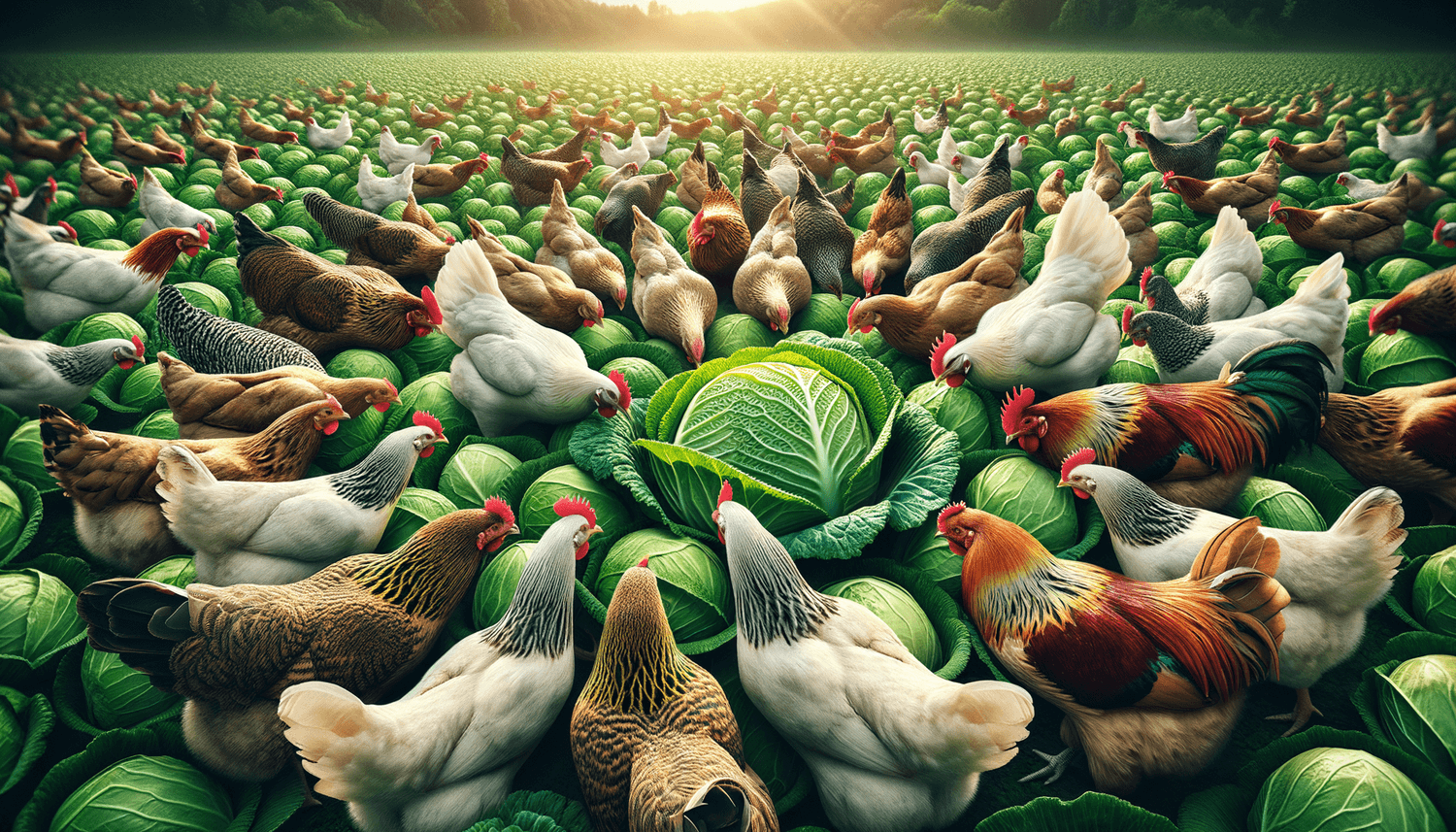Hey there, backyard chicken enthusiasts! Are you looking to mix up the menu for your feathered friends and curious to know if Napa cabbage can make a scrumptious addition? Well, you’ve come to the right place! In this blog post, we’ll be unraveling the mystery of whether or not chickens can chow down on this leafy green, the importance of a well-rounded diet for happy cluckers, and the nutritional benefits and risks associated with Napa cabbage. We’ll also share some creative ways to serve this yummy veggie to your flock, so keep reading!
Can chickens eat napa cabbage?
Yes, chickens can indeed eat Napa cabbage, and it is safe for them to enjoy this leafy vegetable. Napa cabbage offers numerous nutrients and health benefits to your flock, while also serving as a fun and crunchy treat. Just remember to offer it as part of a balanced diet to ensure they receive all the necessary nutrients for their well-being.
A balanced diet for happy hens
Just like us humans, chickens need a well-rounded and balanced diet to thrive and maintain good health. A critical aspect of raising a happy and healthy flock is understanding their dietary needs and ensuring they receive the right nutrients in the correct proportions.
A chicken’s diet should primarily consist of a high-quality chicken feed, which should make up around 80-90% of their diet. This chicken feed typically includes essential protein, vitamins, and minerals needed for optimal growth, egg production, and overall well-being. The remaining 10-20% of their diet can consist of treats like fruits and vegetables, which not only provide additional nutrients but also help in keeping your chickens entertained and engaged.
Nutritional value of napa cabbage for chickens.
Napa cabbage provides various nutrients that can be beneficial for your chickens. Rich in vitamins, minerals, and hydration, this leafy vegetable can make a great addition to your chickens’ diet. One of the key benefits of Napa cabbage is its high water content, which is particularly useful during the hot summer months, helping to keep your chickens hydrated and healthy.
Furthermore, Napa cabbage is an excellent source of vitamins, particularly vitamins A, C, and K, which play a crucial role in maintaining your chickens’ immune system, vision, and bone health, ensuring that they remain strong and active. Additionally, this vegetable is a good provider of essential minerals such as calcium, potassium, and magnesium, promoting bone and muscle health, overall growth, and eggshell formation.
With its nutritional value and enticing crunchiness, Napa cabbage can indeed be a delightful and beneficial treat for your chickens. However, it is essential to consider all elements of their diet to make sure they have a varied and healthy meal plan and not depend solely on this vegetable for their nutritional needs.
Nutrition table of napa cabbage for chickens.
| Information | Description |
|---|---|
| Nutritional Value | Napa cabbage is a good source of vitamins A, C, and K, calcium, potassium, and magnesium. |
| Suggested Serving Size | Offer Napa cabbage in moderation, making up approximately 10-20% of your chickens’ diet. |
| Safe Feeding Practices | Ensure Napa cabbage is clean and free of pesticides, and remove any spoiled or rotten parts. |
| Preparation | Chop or shred the Napa cabbage and scatter it in their coop or run to encourage foraging and exercise. |
| Potential Risks | If fed in excess, Napa cabbage might cause digestive upsets or nutritional imbalances. |
| Hydration | Napa cabbage has a high water content that can help keep chickens hydrated, particularly during hot weather. |
| Digestion | Being primarily high in fiber, Napa cabbage can aid in digestion and support a healthy gastrointestinal tract. |
| Seasonal Availability | Napa cabbage is typically available year-round, with peak season being in late fall and into winter. |
| Other Benefits | Napa cabbage helps in improving the immune system, vision, bone health, and overall growth of chickens. |
Proper storage and spoilage prevention
Keeping Napa cabbage fresh before serving it to your chickens is important to avoid any potential health risks associated with spoiled vegetables. Store Napa cabbage in a cool and dry place, or keep it in the refrigerator in a breathable bag. Be sure to inspect the cabbage before feeding it to your chickens, and remove any parts that show signs of spoilage or rot.
Entertain your flock with Napa cabbage
Feeding Napa cabbage to your chickens can also be a source of entertainment and mental stimulation. For a fun twist, you can hang a whole head of Napa cabbage from a rope just above the ground in their run, allowing them to peck at it and engage in a bit of playful exercise.
Alternatives to Napa cabbage
In case Napa cabbage is not readily available or you’d like to offer your chickens some variety, there are plenty of other leafy greens they can enjoy. Some suitable alternatives include kale, Swiss chard, lettuce, and spinach. Remember to always offer these vegetables in moderation and within the recommended proportion of their overall balanced diet.
In conclusion, Napa cabbage can be a nutritious and enjoyable treat for your chickens when offered as part of their balanced diet. It provides essential vitamins and minerals, along with hydration, digestive benefits, and opportunities for foraging and exercise. Just make sure to follow the safe feeding practices, serving size recommendations, and proper storage guidelines to keep your chickens healthy and satisfied.

















